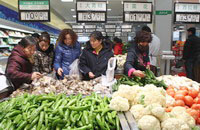Ministry promises enough produce for festival
Updated: 2013-02-01 10:54
By Li Jiabao (China Daily)
|
|||||||||||
The Ministry of Commerce pledged on Thursday to ensure the steady supply of agricultural products during Spring Festival after inflation picked up in December.
"The recent increase of vegetable prices was mainly due to the bad weather, which affected production and supply," Wang Bin, deputy director-general of the Department of Market Operations and Consumption Promotion at the Ministry of Commerce, told a news briefing on Thursday.
"In addition, rising costs of labor, land and agricultural resources were also blamed. As the bad weather will last for a while and consumption is expected to increase during Spring Festival, the prices of some vegetables will remain high."
|
 People are seen buying farm products at a supermarket in Xuchang, Henan province, Jan 27.Vegetable prices increased recently, mainly due to the bad weather, which affected production and supply. [Geng Guoqing / Asianewsphoto] |
Spring Festival falls on Feb 10 this year.
Wang added that the supply and demand of farm products is "generally balanced" and that market supply during the festival - a peak time for food consumption - will be steady. However, some sellers may face a difficult time after the holiday season, as warmer weather will increase the supply of vegetables.
January saw farm product prices in 36 large and medium-sized cities increase 3.1 percent from December, while vegetable prices rose 16.6 percent in the same period, according to the ministry.
"In the medium and long term, farm product prices will see a rising trend because of growing costs and resource constraints in land and water. In addition, supply in large cities mainly comes from other regions, and bad weather often creates challenges for logistics and adds costs to the supply chain," said Kong Lingyu, deputy director-general of the Department of Market System Development at the Ministry of Commerce.
Premier Wen Jiabao said on Wednesday during an inspection tour of the National Development and Reform Commission, the country's top economic planning agency, that issues regarding consumer prices should "never be underestimated" and that China should better address relations between economic growth, structural reform and inflation to keep the economy expanding at a reasonable level.
China's consumer price index, a main gauge of inflation, rose 2.6 percent year-on-year in 2012, well below the government's annual target of keeping inflation under 4 percent. However, inflation picked up steam in December and grew 2.5 percent, compared with 2 percent increase seen in November and the whole year's slowest pace of 1.7 percent in October, according to the National Bureau of Statistics.
Vegetable prices surged in December contributing about 60 percent to the CPI rebound, according to Ma Jiantang, head of the National Bureau of Statistics.
"The current price increases of farm products will influence the CPI in the short term, but won't have much of an impact on the full-year development," said Xu Wei, a researcher at the China Center for International Economic Exchanges.
Yi Gang, deputy head of the People's Bank of China, warned during the World Economic Forum in Davos recently that China could see its inflation rise to 3 percent or higher this year.
According to a note from the Financial Research Center of the Bank of Communications, the CPI is in an upward trend in 2013 as economic growth bounced back in the fourth quarter of last year and pork prices keep rising. Imported inflation due to the quantitative easing measures in developed economies and rising costs at home are also to blame, it added.
Qu Hongbin, HSBC China's chief economist, wrote in an article on the Chinese website of the Financial Times on Thursday that the CPI rise will likely be moderate in 2013 amid a moderate economic rebound. But Qu added that the inflation is open to the supply impact, especially because food prices account for more than 30 percent of the CPI but are sensitive to weather changes.
"The tight supply of vegetables in recent years reflects the low modernization of supply chains as China's supply chain costs are the double of those in developed economies," said the ministry's spokesman, Yao Jian.
lijiabao@chinadaily.com.cn
Chinese govt urges measures to stabilize food prices
Farm produce prices still rising: MOC
Authorities vows to rein in vegetable prices
Vegetable prices on the rise in Jan
Related Stories
China's farm produce output grows in 2012 2013-01-21 09:55
Vegetable prices on the rise in Jan 2013-01-14 15:20
China's farm produce prices climb further 2012-12-19 11:26
Self-service vegetable and newspaper stands in China 2012-11-15 18:00
Potted vegetable, consumers' new favorite 2012-11-08 16:13
Vegetable prices fall after six-week rally 2012-09-04 15:38
Today's Top News
Police continue manhunt for 2nd bombing suspect
H7N9 flu transmission studied
8% growth predicted for Q2
Nuke reactor gets foreign contract
First couple on Time's list of most influential
'Green' awareness levels drop in Beijing
Palace Museum spruces up
Trading channels 'need to broaden'
Hot Topics
Lunar probe , China growth forecasts, Emission rules get tougher, China seen through 'colored lens', International board,
Editor's Picks

|

|

|

|

|

|





